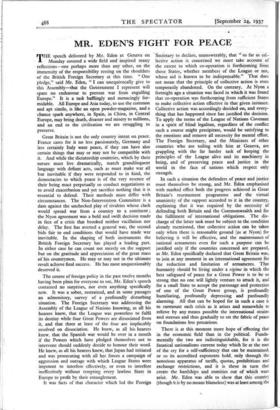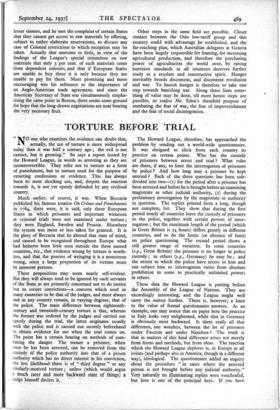MR. EDEN'S FIGHT FOR PEACE
THE speech delivered by Mr. Eden at Geneva on Monday covered a wide field and inspired many reflections—one perhaps more than any other, on the immensity of the responsibility resting on the shoulders of the British Foreign Secretary at this time. " One pledge;" said Mr. Eden, " I can unequivocally give to this Assembly—that the Government I represent will spare no endeavour to prevent war from engulfing Europe." It is a task bafflingly and menacingly for- midable. All Europe and Asia today, to use the common and apt simile, is like an open powder-magazine, and a chance spark anywhere, in Spain, in China, in Central Europe, may bring death, disaster and misery to millions, and an end to the civilisation we are struggling to preserve.
Great Britain is not the only country intent on peace. France cares for it no less passionately, Germany and less certainly Italy want peace, if they can have also certain things that may or may not be compatible with it. And while the dictatorship countries, which by their nature must live dramatically, match grandiloquent language with defiant acts, such as must make war all but inevitable if they were responded to in kind, the democracies to which peace is of the very essence of their being must perpetually so conduct negotiations as to avoid exacerbation and yet sacrifice nothing that it is -essential to defend. Their methods must differ with circumstances. The Non-Intervention Committee is a dam against the unchecked play of rivalries whose clash would spread war from a country to a continent ; the Nyon agreement was a bold and swift decision made in face of a crisis that brooked neither vacillation nor delay. The first has averted a general war, the second bids fair to end conditions that would have made war inevitable. In the shaping of both instruments the British Foreign Secretary has played a leading part. In either case he can count not merely on the support but on the gratitude and appreciation of the great mass of his countrymen. He may or may not in the ultimate result achieve final success. He has most unquestionably deserved it.
The course of foreign policy in the past twelve months having been plain for everyone to see, Mr. Eden's speech contained no surprises, nor even anything specifically new. It was a sober, restrained, and in some passages an admonitory, survey of a profoundly disturbing situation. The Foreign Secretary was addressing the Assembly of the League of Nations knowing, as all his hearers knew, that the League was powerless to fulfil its destiny while four Great Powers are dissociated from it, and that three at least of the four are implacably resolved on dissociation. He knew, as all his hearers knew, that the Spanish war would be over in a month if the Powers which have pledged themselves not to intervene should suddenly decide to honour their word. He knew, as all his hearers knew, that Japan had initiated and was prosecuting with all her forces a campaign of aggression and outrage with which League States were impotent to interfere effectively, or even to interfere ineffectively without tempting every lawless State in Europe to profit by their entanglement.
It was facts of that character which led the Foreign Secretary to declare, unanswerably, that " so far as co', lective action is concerned we must take account of the extent to which co-operation is forthcoming from those States, whether members of the League or not, whose aid is known to be indispensable." That does not mean that the principle of collective action is even temporarily abandoned. On the contrary_ At Nyon a fortnight ago a situation was faced in which it was found that co-operation was forthcoming from sufficient States to make collective action effective in that given instance. Collective action was accordingly decided on, and every- thing that has happened since has justified the decision. To apply the terms of the League of Nations Covenant in a spirit of blind legalism, regardless of the conflict such a course might precipitate, would be satisfying to the emotions and remove all necessity for mental effort. The Foreign Secretary, and the Ministers of other countries who are toiling with him at Geneva,, are grappling with the far harder task of keeping the principles of the League alive and its machinery in being, and of preserving peace and justice in the world in the face of nations which respect only strength.
In such a situation the defenders of peace and justice must themselves be strong, and Mr. Eden emphasised with marked effect both the progress achieved in Great Britain's rearmament programme and the virtual unanimity of the support accorded to it in the country, explaining that it was required by the necessity of defending both Britain and the Commonwealth and for the fulfilment of international obligations. The dis- charge of the latter task must be subject to the condition already mentioned, that collective action can be taken only when there is reasonable ground (as at Nyon) for believing it will be effective, and the maintenance of national armaments even for such a purpose can be justified only if the countries concerned are prepared, as Mr. Eden specifically declared that Great Britain was, to join at any moment in an international agreement for the reduction and limitation of armaments. That humanity should be living under a regime in which the best safeguard of peace for a Great Power is to be so strong that no one will lightly venture to attack it, and for a small State to accept the patronage and protection of one of the Great Power group, is profoundly humiliating, profoundly depressing and profoundly alarming. All that can be hoped for in such a case is to surmount each crisis as it arises and meanwhile to relieve by any means possible the international strains and stresses and thus gradually to set the fabric of peace on foundations less precarious.
There is at this moment more hope of effecting that in the economic field than in the political. Funda- mentally the two are indistinguishable, for it is the fanatical nationalisms current today which lie at the root of the cry for a self-sufficiency that can be maintained, or so its accredited exponents hold, only through the notorious apparatus of tariffs, quotas, prohibitions and exchange restrictions, and it is these in turn that create the hardships and enmities out of which wars arise. Mr. Eden was able to show that this country (though it is by no means blameless) was at least among the lesser sinners, and he met the complaint of certain States that they cannot get access to raw materials by offering, subject to rather elaborate reservations, to discuss any case of Colonial restrictions to which exception may be taken. Actually that amounts to little, in view_ of the findings of the League's special committee on raw materials that only 3 per cent. of such materials come from dependent colonies, and that if European States are unable to buy these it is only because they are unable to pay for them. More promising and more encouraging was his reference to the importance of an Anglo-American trade agreement, and since the American Secretary of State was simultaneously empha- sising the same point in Boston, there seems some ground for hope that the long-drawn negotiations are near bearing the very necessary fruit. Other steps in the same field are possible. Closer contact between the Oslo low-tariff group and this country could with advantage be established, and the far-reaching plan, which Australian delegates at Geneva have been largely responsible for framing, for increasing agricultural production, and therefore the purchasing power of agriculturists the world over, by raising nutrition standards in all countries deserves further study in a resolute and constructive spirit. Hunger inevitably breeds discontent, and discontent revolution and war. To banish hunger is therefore to take one step towards banishing war. Along those lines some- thing of value may be done, till more heroic steps are possible, to. realise Mr. Eden's threefold purpose of combating the fear of war, the fear of impoverishment and the fear of social disintegration. .



















































 Previous page
Previous page